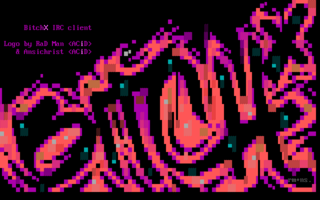
BitchX is a free IRC client that has been regarded as the most popular ircII-based IRC client. The initial implementation, written by "Trench" and "HappyCrappy", was a script for the IrcII chat client. It was converted to a program in its own right by panasync. BitchX 1.1 final was released in 2004. It is written in C and is a TUI application utilizing ncurses. GTK+ toolkit support has been dropped. It works on all Unix-like operating systems, and is distributed under a BSD license. It was originally based on ircII-EPIC, and eventually it was merged into the EPIC IRC client. It supports IPv6, multiple servers and SSL, and a subset of UTF-8 with an unofficial patch.

mIRC is an Internet Relay Chat (IRC) client for Windows, created in 1995. It is a fully functional chat utility and its integrated scripting language makes it extensible and versatile.

Internet Relay Chat (IRC) is a text-based chat system for instant messaging. IRC is designed for group communication in discussion forums, called channels, but also allows one-on-one communication via private messages as well as chat and data transfer, including file sharing.

ChatZilla is an IRC client that is part of SeaMonkey. It was previously an extension for Mozilla-based browsers such as Firefox, introduced in 2000. It is cross-platform open source software which has been noted for its consistent appearance across platforms, CSS appearance customization and scripting.
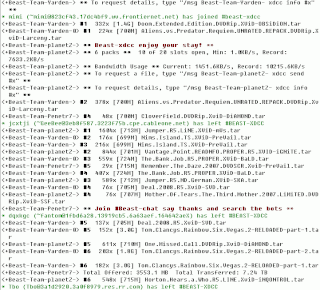
XDCC is a computer file sharing method which uses the Internet Relay Chat (IRC) network as a host service.

Visual IRC (ViRC) is an open-source Internet Relay Chat client for the Windows operating system. Unlike many other IRC clients, nearly all of the functionality in ViRC is driven by the included IRC script, with the result that the program's behavior can be extended or changed without altering the source code.

Bersirc is a discontinued open-source Internet Relay Chat client for the Microsoft Windows operating system. Linux and Mac OS X versions were "in development". Bersirc uses the Claro toolkit, which aims to provide an interface to native windowing systems and widgets on all operating systems. Microsoft .NET and Qt toolkit ports were also planned. The final version of Bersirc was 2.2.14.
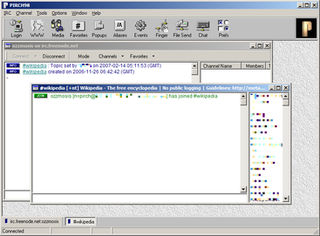
PIRCH or pIRCh is a shareware Internet Relay Chat (IRC) client published by Northwest Computer Services. Its name is an acronym – PolarGeek's IRCHack.
An IRC bot is a set of scripts or an independent program that connects to Internet Relay Chat as a client, and so appears to other IRC users as another user. An IRC bot differs from a regular client in that instead of providing interactive access to IRC for a human user, it performs automated functions.

Eggdrop is a popular IRC bot and the oldest that is still being maintained.
A BNC is a piece of software that is used to relay traffic and connections in computer networks, much like a proxy. Using a BNC allows a user to hide the original source of the user's connection, providing privacy as well as the ability to route traffic through a specific location. A BNC can also be used to hide the true target to which a user connects.
Snak was a shareware Internet Relay Chat (IRC) client written by Kent Sorensen for the Macintosh platform. Snak was distributed as shareware and could be freely used and evaluated for 30 days at no charge. After the 30-day evaluation period has ended, the program would quit after 15 minutes of use, and a registration key had to be purchased. Versions up to 4.12 run on both Mac OS 9 and Mac OS X while version 5 and newer only support Mac OS X. The program is Intel Only as of version 5.3.4. The program is not fully compatible with current macOS versions and is no longer supported, with the developer stating that he is unable to create new versions due to the deprecation of the Carbon libraries. On October 10, 2018, Snak was declared abandonware by the developer and made freeware with a license key published on the project's web site.

IRC scripts are a way of shortening commands and responding automatically to certain events while connected to an IRC network. There are many different scripting languages for different types of IRC clients: ircII, BitchX, HexChat, mIRC, Visual IRC, Bersirc, and others have their own scripting languages, many of which share common features and syntax and therefore are easily portable from one IRC client to another.
Flooding or scrolling on an IRC network is a method of disconnecting users from an IRC server, exhausting bandwidth which causes network latency ('lag'), or just disrupting users. Floods can either be done by scripts or by external programs.
The following tables compare general and technical information between a number of notable IRC client programs which have been discussed in independent, reliable prior published sources.
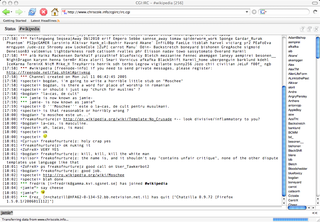
CGI:IRC is a CGI program written in Perl that allows access to IRC via a web browser. It is designed to be flexible and has many uses such as an IRC gateway for an IRC network, a chat-room for a website or to access IRC when stuck behind a restrictive firewall.

WeeChat is a free and open-source Internet Relay Chat client that is designed to be light and fast. It is released under the terms of the GNU GPL-3.0-or-later and has been developed since 2003.

Konversation is an Internet Relay Chat (IRC) client built on the KDE Platform and is free software released under the terms of the GNU GPL-2.0-or-later. Konversation is currently maintained in the KDE Extragear Network module, which means that it has its own release cycle which is independent from the main KDE applications. It is the default IRC client in many prominent Linux distributions, such as openSUSE, the KDE spin of Fedora, and Kubuntu.
Ircle was an IRC client developed by Onno Tijdgat for the Macintosh computer platform. Ircle was shareware, with free upgrades. The client was scriptable with AppleScript, supported multiple channels and servers, and up to ten simultaneous connections. It was discontinued in 2009. Since 2012, Ircle was not compatible with most recent versions of OS X, and no updates were available. In December 2017 the Ircle home page displayed a poll, to end Q2 2018, to determine whether a new version should be released on OS X and iOS. The results of the poll were 311 votes in favor of a new Mac OS version, 43 votes for an iOS version, and 117 votes for both a Mac OS and iOS version, out of 528 votes cast.
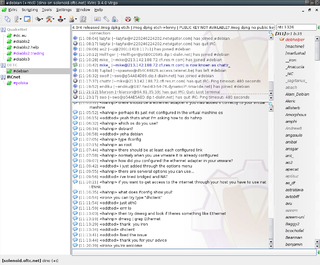
KVIrc is a graphical IRC client for Linux, Unix, Mac OS and Windows. The name is an acronym of K Visual IRC in which the K stands for a dependency to KDE, which became optional from version 2.0.0. The software is based on the Qt framework and its code is released under a modified GNU General Public License.













